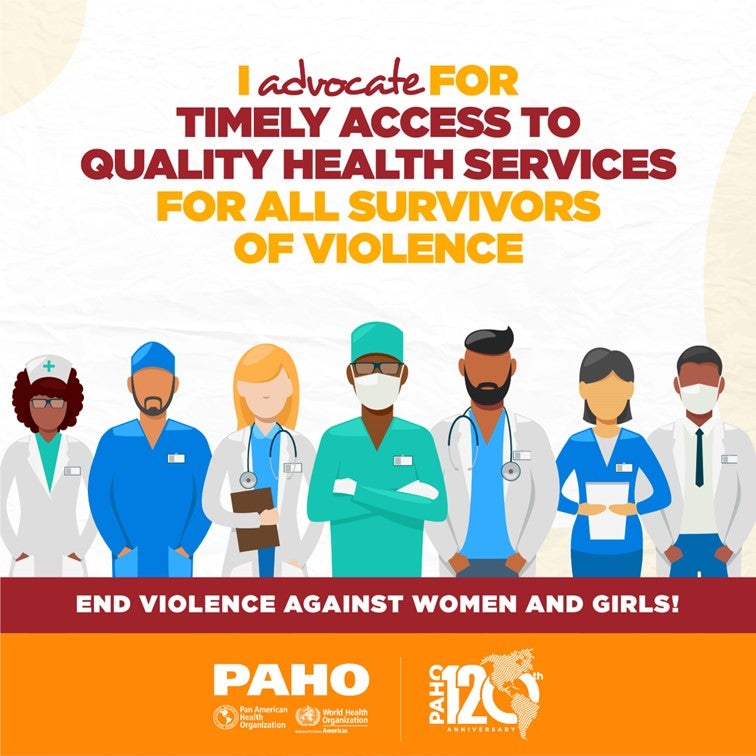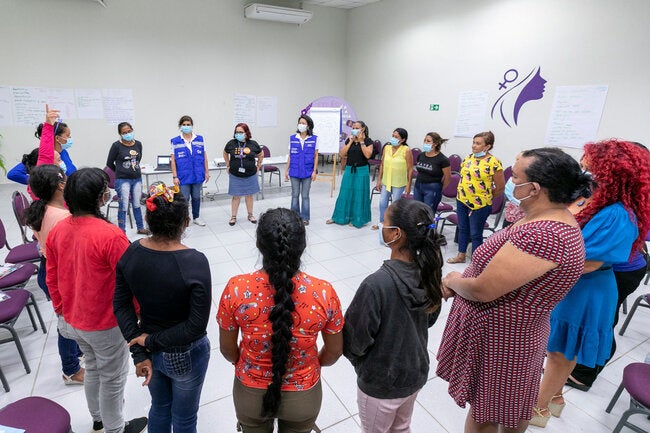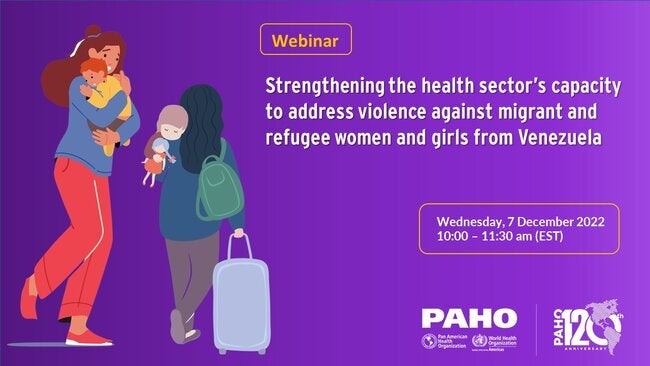Violence against women and girls is a violation of human rights and a major public health problem in the Americas. While any woman can experience violence, some groups face a higher risk of violence and barriers in accessing support. In particular, humanitarian and emergency contexts have a higher risk of violence due to decreased security as a result of the breakdown of social and protection networks.
The flow of refugees and migrants from Venezuela into the Americas constitutes one of the largest movements of people in the history of the Region as millions of people have left the country as a result of the country's economic, institutional and political crisis.
The health system must act to address violence
It is critical that all survivors of violence, including those from migrant and refugee communities, have access to essential health services, including empathic and non-judgmental first-line support.
The health system, when accessed in a timely manner, can also provide critical and time-sensitive interventions for sexual assault, such as emergency contraception to prevent pregnancy, HIV post-exposure prophylaxis, and presumptive treatment for STIs.
The health system can provide assessment and referral to additional services, such as mental health care, as well as referral to support services in other sectors, e.g., shelters, legal assistance, and protective services.
What PAHO is doing
Given the importance of the topic, PAHO is strengthening the health sector's capacity to prevent and respond to violence against migrant and refugee women and girls from Venezuela in the Americas Region through evidence-based strategies and techniques. This includes work in collaboration with four countries in the Region with considerable numbers of migrants: Argentina, Brazil, Colombia, and Peru. This work is aligned with WHO’s Safe from the Start Initiative with support from the Bureau of Population, Refugees, and Migration (PRM) of the US Department of State.
Key interventions in project countries include the development of norms and protocols, development of the capacities of health workers, evaluating the quality of services available to survivors of violence, as well as information sharing and dialogues with health cluster actors and partners.
RESOURCES
Addressing Violence Against Migrant and Refugee Women
For aditional resources visit:
COUNTRY EXPERIENCES
Brazil
PAHO, UNFPA and Intersectoral Protection Network in Brazil train indigenous, trans, migrant and refugee women on gender-based violence prevention
The initiative brought together 20 community leaders, including Venezuelan, Brazilian, and indigenous migrant and refugee women of the Warao and Eñepa ethnic groups. Through active methodologies, such as conversation circles and group dynamics, the participants were able to share experiences, knowledge and tools to implement actions to prevent violence against women in the community. The workshop was held between August 15 and 18, 2022.
Colombia
Humanized health care: opportunities to strengthen the response to gender violence and resilience processes in migrant women..
To reduce the impacts on the physical and mental health of women survivors of gender-based violence, and strengthen the installed capacities of the health sector, PAHO has implemented a project to strengthening the capacities of health officials against the comprehensive approach to cases of gender violence, humanized accompaniment with an approach based on survivors and front-line care in five departments -Guajira, Magdalena, Norte de Santander and Nariño-. The project has been developed with the active participation and coordination with the Ministry of Health and Social Protection, the health cluster, departmental and municipal authorities, and community organizations.
Peru
Strengthening the health sector's capacity to improve the response to violence against migrant and refugee women in Peru
PAHO has collaborated with the Mental Health Directorate of the Ministry of Health of Peru in the formation of a focus team made up of 5 professionals who have worked in three territories -Lima Norte, Lima Centro and Tumbes- prioritized by the presence of a high number of migrants and refugees from Venezuela. The project was oriented towards strengthening local capacities, both for the management and provision of health services in response to violence. As a result, training was provided to 127 health service managers.
Argentina
Meeting on gender-based violence and access to health for migrants
During the celebration of the 16 Days of Activism against gender violence, the Clinical Manual "Comprehensive health care in situations of Gender-based Violence.Tools for health teams" was presented. The meeting took place at CAREF, the Argentinian Commission for Refugees and Migrants. The activity organized by PAHO/WHO included the participation of the National Ministry of Health and more than 20 people from CAREF work teams, including the headquarters of Misiones, Jujuy, Mendoza and CABA. The objective of the meeting was to discuss gender-based violence (VMG) and the prospects for comprehensive health care, with a focus on access for migrant women, specifically Venezuelans.
Brasil
PAHO carries out actions in Brazil to prevent violence against migrant and refugee women, strengthen leadership and promote access to care and rights.
In the initiative, Venezuelan and Haitian women took an active part, receiving information about gender violence, participating in debates and exploring strategies for community prevention. The meeting took place on August 22 and 23, 2023.
EVENTS
Webinar: Strengthening the health sector’s capacity to address violence against migrant and refugee women and girls from Venezuela
On Wednesday, December 7, PAHO will host a regional virtual seminar to present and discuss the activities to address violence against migrant and refugee women and girls in four countries of the Region (Argentina, Brazil, Colombia, and Peru). The webinar will take place from 10:00 to 11:30 am (Washington DC time).














